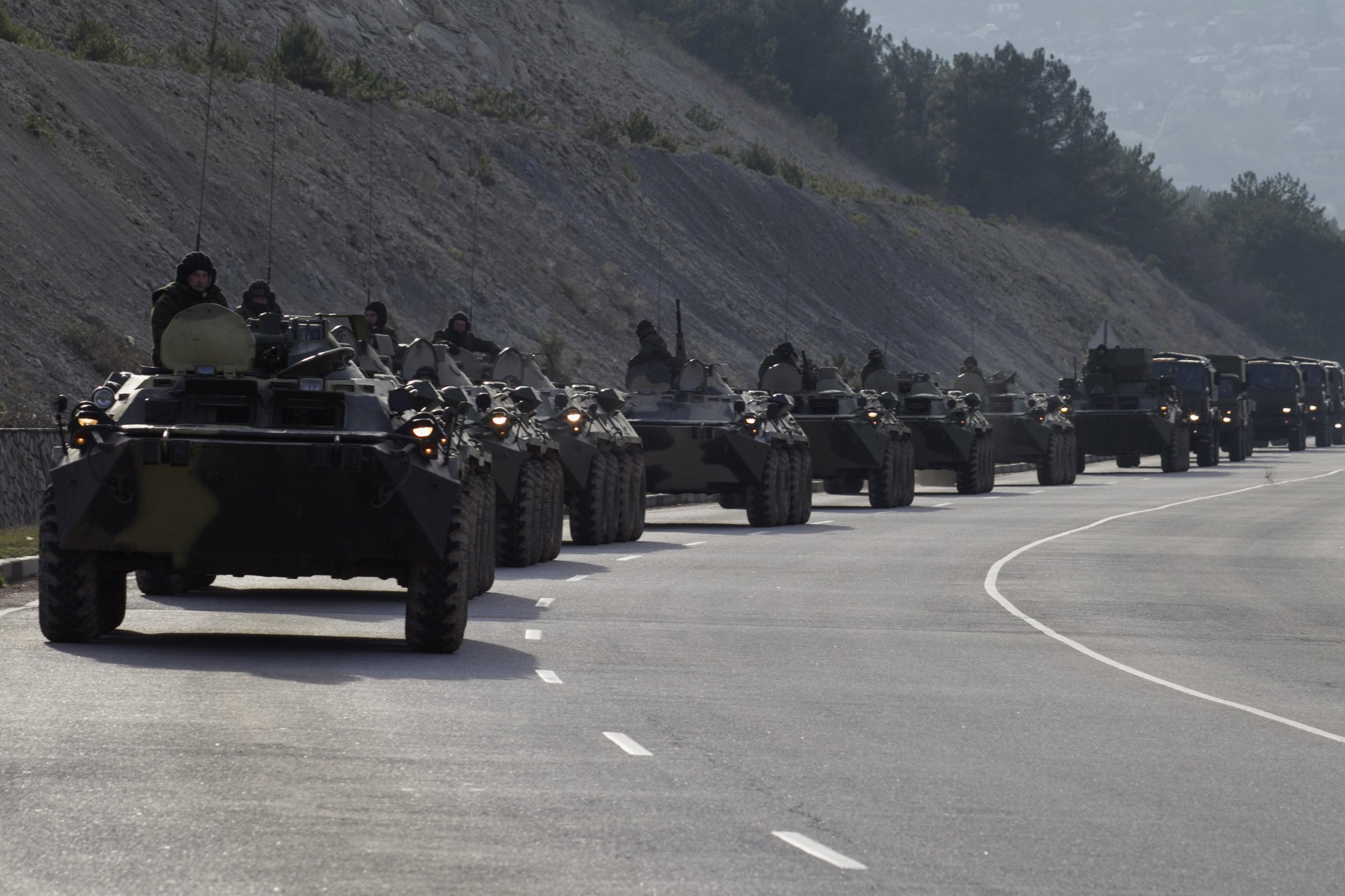
John McCain thinks it's "tragic" there is no military option for the United States in Ukraine.
"I'd love to tell you that there is, but frankly I don't see it," said the Republican senator from Arizona and 2008 presidential candidate.
In lieu of military intervention, McCain thinks Washington should implement a raft of other tough measures to pressure Russian President Vladimir Putin into retreating from Crimea.
McCain is not alone.
As the Obama Administration takes a cautious approach to Ukraine, where Russian troops occupied the Crimea and encouraged a March 16 referendum on whether to leave Ukraine and become part of Russia or an independent state linked to Russia, neo-conservative voices are once again pushing a hard line.
The hawkish wing of the Republican Party – including many of the characters who advocated the 2003 invasion of Iraq – believes Washington should pursue a far more confrontational approach.
After Russian armed forces began occupying Crimea on Feb. 27, the Obama Administration prepared a package of targeted sanctions and visa restrictions on Russians believed crucial to Putin's Crimean adventure. The U.S. and its allies also threatened to remove Russia from the G8.

For foreign policy hawks, these moves don't go nearly far enough.
President George W. Bush's Vice President Dick Cheney echoed McCain's frustration at the lack of military options. "There are military options that don't involve putting troops on the ground in Crimea," he said.
The architect of the Iraq war went on to list how the neo-cons would prefer to punish Putin. These include:
∎ offering Ukraine direct military assistance
∎ conducting joint military exercises with NATO members close to Russia's borders
∎ reviving a ballistic missile defense program based in Poland and the Czech Republic that was put on hold in 2009.
Others have suggested accelerating the expansion of NATO to include more countries on Russia's borders like Moldova and Belarus.
Other leading Republican hawks, such as Sen. Lindsey Graham of South Carolina, are pushing similar proposals.
While these measures fall short of American boots on Crimean ground, all rely on a flexing of U.S. military miht which remains unsurpassed, despite planned Pentagon budget cuts.
They think more aggressive policy options send a stronger sign to Putin that the U.S. will defend its allies in Europe and that the U.S. remains an undisputed superpower with hegemony over security issues in Europe.
Ukraine is not a party to NATO, the 28-member mutual-defense organization founded in 1949 as a Western bulwark against the Soviet Union. But Poland, Latvia, Lithuania and other Russian neighbors are.
"Via NATO, we should be adopting a program now that makes it clear that NATO will defend all members," Elliott Abrams, a leading neocon and a member of the National Security Council under President George W. Bush, told Newsweek. "If we're not going to do that kind of thing because of Putin then we might as well close NATO down."
Abrams believes governments in China, Iran and elsewhere are watching how Obama responds to see how far they can go in defying ultimatums issued by Washington.
But these Cold Warriors face challenges – and not just from the White House and the State Department.
The aggressive foreign policy that dominated the early 2000s – and received support and encouragement from McCain, Cheney, Graham and Abrams – left Americans wary of further global entanglements.
A poll released by Pew in December 2013 found that U.S. support for an active foreign policy is at an all-time low. Fifty-two percent said they agreed the U.S. should "mind its own business internationally," the highest figure since the poll was first conducted in 1964.
When Obama threatened military action against Syria last summer over its use of chemical weapons, the plan fizzled in large part because of a lack of popular domestic support and political will.
And while the Republicans have typically been the more militaristic of America's two political parties, anti-interventionist sentiment is fast growing on the right. That was on display at last week's Conservative Political Action Conference (CPAC).
A straw poll of CPAC delegates crowned Rand Paul, Kentucky's libertarian-leaning senator and a known isolationist, as their favorite presidential candidate. In a recent op-ed, Paul wrote that punishing Russia "does not and should not require military action."
In what seems like a direct riposte to McCain, who accused Obama of falsely thinking the Cold War is over, the darling of libertarian- conservatives wrote that "many U.S. leaders still think in Cold War terms."
Peter King, a Republican congressman from New York, complained that Paul and his neo-isolationist views could end up destroying the Republican Party. "We cannot allow isolationists to take over the Republican Party" King said, "because that will be damaging, not just to the party, more importantly to the country and the world."
But foreign policy adventurists like King face other headwinds. The Pentagon recently unveiled a budget proposing major cuts in military spending. And even Robert Gates, Secretary of Defense under both Bush and Obama, thinks the battle over Crimea is already lost.
The 2003 invasion of Iraq left many Americans wary of interventionist policies, even though the U.S. continues to use military force in Afghanistan, Somalia, Yemen and elsewhere.
"From 1992 until 2008 there was a sense that the U.S. could interfere at a very low cost," said Stephen Walt, a professor of international relations at Harvard. "But since Iraq we've learned that intervention is unpredictable and costly and should be reserved for vital national interests."
That may prove a hard case to make in the case of Ukraine.
Uncommon Knowledge
Newsweek is committed to challenging conventional wisdom and finding connections in the search for common ground.
Newsweek is committed to challenging conventional wisdom and finding connections in the search for common ground.





